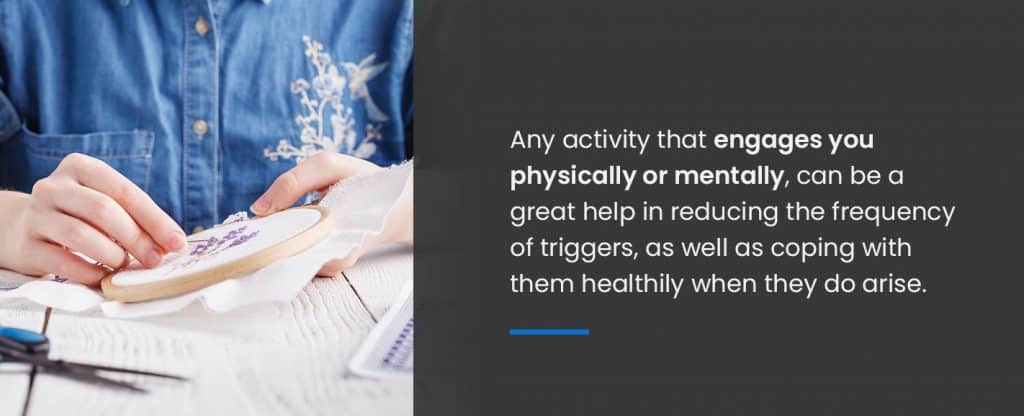10 Tips To Stay Sober in Recovery
Completing an addiction treatment program is an immense accomplishment. You decided to do the work, face your addiction and get sober, so now it’s time to do everything you can to retain that hard-earned sobriety. You will be feeling a huge range of emotions and wondering what life will be like without mood-altering substances — and it’s okay to be nervous about it.
Your continued sobriety will depend on your ability to be flexible and resilient in the face of stress, and these 10 tips will help as you work to build on everything you learned in treatment.
1. Join a Support Group
The natural first step after completing addiction treatment is to find a support group. Throughout treatment, you likely attended group counseling sessions and reaped the benefits of spending constructive time with people who understand your situation.
After treatment, a support group can act as a bridge to connect some of your treatment experience to your everyday life, preventing you from disconnecting. When you experience cravings or need to process triggers, your sponsor or another person from your support group can help you remember you are not alone. Support groups also provide ongoing accountability to help you stay sober after treatment.
2. Prepare Your Story
Something every person in recovery has to deal with is the inevitable barrage of questions you’ll get after completing treatment. If you opted for medication-assisted treatment (MAT) with buprenorphine, your treatment would have been less disruptive to your life than leaving for residential treatment, and you may face less scrutiny. Either way, deciding how much you want to share and with whom is an important step. Being confident in your story will help remind you why you’ve chosen treatment and sobriety, preventing doubts from becoming a relapse trigger.
3. Continue Counseling
You will find that addiction counseling is the cornerstone of a successful recovery, and it can also be integral to continued sobriety after your program is over. Addiction is complex, and everyone’s experience of it is different, so continuing the learning process with counseling ensures you continue to build your coping skills rather than letting them slip.
4. Create Goals

While your foremost goal will continue to be staying sober, it’s also important to slowly bring previous and new goals back into focus during recovery. Some people instantly know what they want to do with their lives after getting sober, while others feel lost after leaving a treatment program. It helps to start small, with easily-achievable goals that improve your daily quality of life, then move on to larger goals that require more planning.
For example: While a long-term goal might be to get a promotion, you can start with smaller goals like letting your manager know you want more responsibility or completing a training course or certification. It helps to use the SMART framework and create goals that are:
- Specific
- Measurable
- Achievable
- Relevant
- Time-bound
5. Identify Your Triggers
Triggers are often the most unpredictable element in a person’s recovery, and everyone struggles with them during and after addiction treatment. Staying sober after treatment relies heavily on being able to notice when a person, place or object is cueing you to crave drugs. Physical signs of a relapse trigger include tension and a tight or sinking feeling in the pit of your stomach. Psychological signs include feeling nervous, panicked or agitated.
When triggered, you may start feeling cornered and like the only solution to your current feelings is to use again. This can lead to worsening thoughts of drug use, which is one of the first signs of relapse. If you can identify your triggers, you can avoid them or actively employ your coping skills to handle them.
6. Eat Well
Nutrition is a key element in staying healthy and sober after treatment. Drug use frequently leads to poor nutritional habits, which make it harder to recover from addiction. Eating a balanced diet can help you stay sober by:
- Healing the body and reversing some of the damage from substance abuse.
- Stabilizing your mood and reducing stress levels.
- Reducing cravings for drugs.
- Encouraging a healthy lifestyle and self-care.
If you aren’t used to feeding yourself well, it’s a good idea to invest in cooking classes or a few consultations with a dietitian. Planning at least one nutritionally complete meal a day is a great step toward ensuring your body and brain have what they need to function properly and minimize cravings.
7. Get Enough Exercise
Most Americans aren’t getting the recommended 150 minutes of aerobic exercise we should have each week. Getting your blood pumping and working your muscles has been proven to relieve stress, improve mood, reduce symptoms of depression and reduce drug cravings. It can be challenging to gather the energy and dedication to start a regular exercise routine, so don’t be afraid to start small with something like a brisk walk around the block or a brief in-home bodyweight exercise circuit. When it comes to exercise, any activity is better than remaining sedentary.
8. Get a Hobby

Boredom itself can be a strong relapse trigger, so it’s best to avoid excessive idle time by picking up a hobby. Any activity that engages you physically or mentally, can be a great help in reducing the frequency of triggers, as well as coping with them healthily when they do arise. Most hobbies also involve building a skill, which gives you something to work towards and improves your self-esteem.
9. Give Back
Finding a way to give back to the community is something most people find deeply fulfilling. Putting your skills or labor to use in service of others can help ground you and give you a sense of purpose that can give you strength when you’re struggling with drug cravings. Volunteering helps you spend free time constructively and can be an excellent way to socialize — both of which are key in staying sober after treatment.
10. Create a Routine
Especially in early recovery, stability is essential to staying sober. The best way to facilitate stability for yourself is to create a daily routine in which you perform certain activities at pre-determined times. While you don’t need to structure every minute of every day, your routine should address:
- Wake-up and bedtimes
- Meal times
- Exercise
- Recovery activities, like counseling or support group attendance
Starting with these building blocks, you can create a strong defense against relapse triggers and drug cravings.
AppleGate Recovery Is Here to Help
Opioid addiction is a powerful disease, and it requires significant dedication to overcome. The process of recovery is not linear for everyone, and slip-ups can happen. At AppleGate Recovery, we are deeply familiar with the ups and downs of sobriety from opioids. Although our office-based opioid treatment programs (OBOTs) focus on relapse prevention counseling, we are still here for our patients when they need further support.
To learn more about AppleGate Recovery’s programs and services, call 888.488.5337 or reach out through our contact form. We’re ready to answer your questions and guide you through the first steps to achieving and maintaining sobriety.

Contact AppleGate Recovery Today
If opioid addiction is impacting your life or the life of someone you care about, reach out to our treatment center. We are here to provide the support and care you need to take the first step toward recovery.
Call 888.488.5337